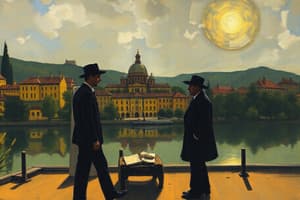Podcast
Questions and Answers
Define Economics.
Define Economics.
Economics is the social science that involves the use of scarce resources to satisfy unlimited wants.
What is the difference between ends and scarce means in the study of economics?
What is the difference between ends and scarce means in the study of economics?
In economics, ends refer to the goals or objectives that people hope to achieve. Scarce means are the limited resources available to fulfill those goals.
Define scarcity in the context of economics.
Define scarcity in the context of economics.
Scarcity is a condition where there are insufficient resources to satisfy all the needs and wants of a population.
Define opportunity cost in the context of economics.
Define opportunity cost in the context of economics.
What are the four basic factors of production in economics?
What are the four basic factors of production in economics?
What is the difference between microeconomics and macroeconomics?
What is the difference between microeconomics and macroeconomics?
What is the focus of normative economics?
What is the focus of normative economics?
What does economic system refer to?
What does economic system refer to?
Which of the following are the four main categories of economic systems?
Which of the following are the four main categories of economic systems?
Flashcards
What is economics?
What is economics?
The study of how individuals and societies make choices about how to use scarce resources to satisfy their unlimited wants and needs.
Scarcity
Scarcity
A situation where there are not enough resources available to satisfy everyone's wants and needs.
Opportunity Cost
Opportunity Cost
The value of the best alternative that is given up when a choice is made.
Land (Factor of Production)
Land (Factor of Production)
Signup and view all the flashcards
Labor (Factor of Production)
Labor (Factor of Production)
Signup and view all the flashcards
Capital (Factor of Production)
Capital (Factor of Production)
Signup and view all the flashcards
Entrepreneurship (Factor of Production)
Entrepreneurship (Factor of Production)
Signup and view all the flashcards
Microeconomics
Microeconomics
Signup and view all the flashcards
Macroeconomics
Macroeconomics
Signup and view all the flashcards
Positive Economics
Positive Economics
Signup and view all the flashcards
Normative Economics
Normative Economics
Signup and view all the flashcards
Economic System
Economic System
Signup and view all the flashcards
Traditional Economy
Traditional Economy
Signup and view all the flashcards
Command Economy
Command Economy
Signup and view all the flashcards
Free Market Economy
Free Market Economy
Signup and view all the flashcards
Mixed Market Economy
Mixed Market Economy
Signup and view all the flashcards
Basic Economic Problems
Basic Economic Problems
Signup and view all the flashcards
What to Produce & How Much?
What to Produce & How Much?
Signup and view all the flashcards
How to Produce?
How to Produce?
Signup and view all the flashcards
For Whom to Produce?
For Whom to Produce?
Signup and view all the flashcards
Study Notes
Introduction to Economics
- Economics is the social science that involves using scarce resources to satisfy unlimited wants.
- Another definition of economics is the science that studies human behavior as a relationship between ends and scarce means with alternative uses.
Scarcity
- Scarcity is a condition of insufficient resources to satisfy all needs and wants of a population.
Choice & Decision-Making
- Opportunity cost is the value of the best foregone alternative.
Economic Resources (Factors of Production)
- Land: soil and natural resources found in nature, not man-made.
- Labor: physical and human effort exerted in production.
- Capital: man-made resources used in the production of goods and services (machines, equipment).
- Entrepreneurship: organizing the other factors of production and risk-taking.
Main Branches of Economics
- Microeconomics: studies individual entities (consumers, producers, resource owners). It analyzes decisions and choices and how they impact market prices.
- Macroeconomics: studies the overall performance of an economy. It focuses on the flow of goods and resources, aggregate movement of goods and services, and general employment of resources.
Methodologies of Economics
- Normative economics: focuses on policy formulation to achieve an ideal situation.
- Positive economics: focuses on describing what is happening in an economy, possibly far from ideal.
Economic System
- An economic system is a set of economic institutions that dominate a given economy with the objective of solving economic problems.
4 Categories of Economic Systems
- Traditional Economy: Past experiences and generational knowledge guide economic decisions.
- Command Economy: Decisions come from a top authority and are then applied to the majority.
- Free Market Economy: Individual consumers and businesses interact to solve economic problems.
- Mixed Market Economy: Both private and public institutions exercise economic control.
Basic Economic Problems of Society
- What to produce and how much?
- How to produce?
- For whom to produce?
Studying That Suits You
Use AI to generate personalized quizzes and flashcards to suit your learning preferences.




